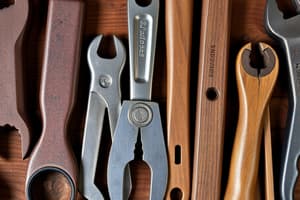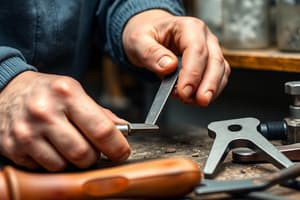Podcast
Questions and Answers
What is the primary function of a hoe in gardening?
What is the primary function of a hoe in gardening?
- Gathering leaves and hay
- Removing weeds and shaping soil (correct)
- Shaping soil and planting seeds
- Digging and lifting heavy materials
Which harvesting tool is best suited for large fields and is more efficient than a sickle?
Which harvesting tool is best suited for large fields and is more efficient than a sickle?
- Combine harvester
- Scythe (correct)
- Sickle
- Reaper
Which irrigation system is most efficient in conserving water?
Which irrigation system is most efficient in conserving water?
- Subsurface irrigation
- Drip irrigation (correct)
- Sprinkler system
- Surface irrigation
What does a plow primarily do in agricultural practices?
What does a plow primarily do in agricultural practices?
Which of the following irrigation methods applies water below the soil surface?
Which of the following irrigation methods applies water below the soil surface?
What is a key advantage of a combine harvester compared to a traditional sickle?
What is a key advantage of a combine harvester compared to a traditional sickle?
Which of the following implements is designed to penetrate compacted soil without disturbing the topsoil?
Which of the following implements is designed to penetrate compacted soil without disturbing the topsoil?
Which tool is specifically designed for transferring small amounts of soil?
Which tool is specifically designed for transferring small amounts of soil?
Flashcards are hidden until you start studying
Study Notes
Hand Tools
-
Shovel:
- Used for digging, lifting, and moving bulk materials.
- Different types: spade (for digging) and scoop shovel (for moving).
-
Hoe:
- Used for shaping soil, removing weeds, and clearing soil.
- Variations: draw hoe (for digging) and stirrup hoe (for weeding).
-
Rake:
- Used for gathering leaves, hay, or soil.
- Types: garden rake (for soil) and thatching rake (for removing dead grass).
-
Trowel:
- Small hand tool used for digging, planting, and transferring small amounts of soil.
-
Pruning Shears:
- Used for cutting branches and shaping plants.
- Essential for maintaining healthy crops and trees.
Irrigation Systems
-
Drip Irrigation:
- Delivers water directly to plant roots.
- Efficient and conserves water by minimizing evaporation.
-
Sprinkler System:
- Distributes water through a network of pipes and spray heads.
- Mimics natural rainfall; suitable for large areas.
-
Surface Irrigation:
- Water flows over the soil surface to reach plants.
- Simple and low-cost, requires proper landscape slope.
-
Subsurface Irrigation:
- Water applied below the soil surface.
- Reduces water evaporation and weed growth.
Harvesting Tools
-
Sickle:
- Curved blade used for cutting grass or harvesting crops.
- Ideal for small-scale harvesting.
-
Scythe:
- Long, curved blade mounted on a handle; used for mowing or reaping.
- More efficient for larger fields compared to sickle.
-
Reaper:
- Machine used for cutting and gathering crops.
- Increases efficiency in harvesting.
-
Combine Harvester:
- Agricultural machine that combines reaping, threshing, and winnowing.
- Suitable for large-scale grain harvests.
Plowing Equipment
-
Plow:
- Implements used to turn and break up soil.
- Types include moldboard plow (for deep tillage) and chisel plow (for less disturbance).
-
Disc Harrow:
- Uses rotating discs to break up soil and incorporate residues.
- Effective for preparing seedbeds.
-
Tiller:
- Rotates through the soil to aerate and mix organic matter.
- Suitable for smaller plots and gardens.
-
Subsoiler:
- Penetrates compacted soil layers without turning over the topsoil.
- Improves drainage and root growth.
Hand Tools
- Shovel: Essential for digging, lifting, and transporting bulk materials; variations include spade (efficient for digging) and scoop shovel (ideal for transferring materials).
- Hoe: Versatile tool for soil shaping, weed removal, and garden maintenance; types include draw hoe (effective for digging) and stirrup hoe (designed for weeding).
- Rake: Useful for collecting leaves, hay, or soil; different forms include garden rake (focused on soil leveling) and thatching rake (specifically removes dead grass).
- Trowel: Compact hand tool designed for digging, planting, and transferring small volumes of soil, perfect for gardening tasks.
- Pruning Shears: Essential for trimming branches and shaping plants, playing a critical role in maintaining healthy crops and gardens.
Irrigation Systems
- Drip Irrigation: Highly efficient system that delivers water directly to the plant roots, significantly reducing water loss through evaporation.
- Sprinkler System: Uses a network of pipes and spray heads to mimic natural rainfall, effective for watering large areas.
- Surface Irrigation: Water flows across the soil surface to irrigate plants; a simple, low-cost method that requires careful landscape slope management.
- Subsurface Irrigation: Involves applying water below the soil surface, which helps minimize evaporation and control weed growth.
Harvesting Tools
- Sickle: A curved cutting tool best suited for mowing grass or harvesting crops, ideal for small-scale agricultural use.
- Scythe: Long, curved blade mounted on a handle, effective for mowing or reaping larger fields, more efficient than a sickle for expansive areas.
- Reaper: A machine designed to cut and gather crops mechanically, increasing the speed and efficiency of the harvesting process.
- Combine Harvester: An advanced agricultural machine that integrates reaping, threshing, and winnowing functions, ideal for large-scale grain harvesting.
Plowing Equipment
- Plow: Tools used for turning and breaking soil; variations include moldboard plow (optimal for deep tillage) and chisel plow (minimizes soil disturbance).
- Disc Harrow: Utilizes rotating discs for soil breakup and residue incorporation, effective for preparing seedbeds for planting.
- Tiller: A tool that aerates and mixes organic matter into the soil, suited for smaller plots and gardening applications.
- Subsoiler: Designed to penetrate compacted soil layers without disturbing the topsoil, enhancing drainage and promoting root growth.
Studying That Suits You
Use AI to generate personalized quizzes and flashcards to suit your learning preferences.




